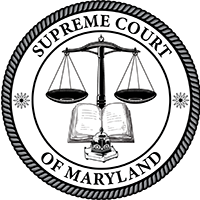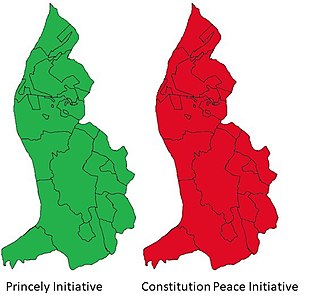
The Australian Electoral Commission (AEC) is the independent federal agency responsible for the management of federal Australian elections, by-elections and referendums.

The Supreme Court of Maryland is the highest court of the U.S. state of Maryland. The court, which is composed of one chief justice and six associate justices, meets in the Robert C. Murphy Courts of Appeal Building in the state capital, Annapolis. The term of the Court begins the second Monday of September. The Court is unique among American courts in that the justices wear red robes.
The current Constitution of the State of Maryland, which was ratified by the people of the state on September 18, 1867, forms the basic law for the U.S. state of Maryland. It replaced the short-lived Maryland Constitution of 1864 and is the fourth constitution under which the state has been governed. It was last amended in 2022.

Elections in Botswana take place within the framework of a multi-party democracy and a parliamentary system. The National Assembly is mostly directly elected, and in turn elects the President and some of its own members. The Ntlo ya Dikgosi is a mixture of appointed, hereditary and indirectly elected members.

The 1948 Alberta general election was held on August 17, 1948, to elect members of the Legislative Assembly of Alberta.

Elections in Lithuania are held to select members of the parliament, the president, members of the municipal councils and mayors, as well as delegates to the European Parliament. Lithuanian citizens can also vote in mandatory or consultative referendums.
The Alaska Supreme Court is the state supreme court for the U.S. state of Alaska. Its decisions are binding on all other Alaska state courts, and the only court its decisions may be appealed to is the Supreme Court of the United States. The Alaska Supreme Court hears appeals from lower state courts and also administers the state's judicial system.

The Commission on Elections, abbreviated as COMELEC, is one of the three constitutional commissions of the Philippines. Its principal role is to enforce all laws and regulations relative to the conduct of elections in the Philippines.
The Constitution of the State of Ohio is the basic governing document of the State of Ohio, which in 1803 became the 17th state to join the United States of America. Ohio has had three constitutions since statehood was granted.
The Tennessee Plan is a system used to appoint and elect appellate court judges in Tennessee. It is largely patterned after the Missouri Plan, and an earlier version in Tennessee was called the Modified Missouri Plan. At the end of every judge's eight-year term following a judicial appointment to the highest courts, retention elections are held, which have the option of whether each judge shall be retained through a yes-no option. This system applies to the Tennessee Supreme Court, the Tennessee Court of Appeals, and the Tennessee Court of Criminal Appeals.
Referendums concerning the independence of judges and four-year parliamentary terms were put to New South Wales voters on 25 March 1995. The referendums coincided with that year's New South Wales general election. Both changes had the support of the major political parties and were approved by large majorities.

Various kinds of elections in Connecticut occurs annually in each of the state's cities and towns, the exact type of which is dependent on the year. Elections for federal and statewide offices occur in even-numbered years, while municipal elections occur in odd-numbered ones. The office of the Connecticut Secretary of State oversees the election process, including voting and vote counting. In a 2020 study, Connecticut was ranked as the 20th easiest state for citizens to vote in.

A constitutional referendum regarding the Prince’s powers was held in Liechtenstein on 14 March 2003. The referendum had two questions: a "Princely Initiative" and a "Constitution Peace Initiative". The first question passed with 64.32% in favour and the second question was rejected by 83.44% of voters.

The 2010 Virginia State Elections took place on Election Day, November 2, 2010, the same day as the U.S. House elections in the state. The only statewide elections on the ballot were three constitutional referendums to amend the Virginia State Constitution. Because Virginia state elections are held on off-years, no statewide officers or state legislative elections were held. All referendums were referred to the voters by the Virginia General Assembly.
Arizona State Legislature v. Arizona Independent Redistricting Commission, 576 U.S. 787 (2015), was a United States Supreme Court case where the Court upheld the right of Arizona voters to remove the authority to draw election districts from the Arizona State Legislature and vest it in an independent redistricting commission. In doing so, the Court expressly rejected a nascent version of the independent state legislature theory.

Philadelphia's municipal election of November 7, 1961, involved the election of the district attorney, city controller, and several judgeships. Democrats swept all of the city races but saw their vote totals much reduced from those of four years earlier, owing to a growing graft scandal in city government. District Attorney James C. Crumlish, Jr. and City Controller Alexander Hemphill, both incumbents, were returned to office. Several ballot questions were also approved, including one permitting limited sales of alcohol on Sundays.

Kentucky state elections in 2018 were held on Tuesday, November 6, 2018, with the primary elections being held on May 22, 2018. These midterm elections occurred during the presidency of Republican Donald Trump and the governorship of Republican Matt Bevin, alongside other elections in the United States. All six of Kentucky's seats in the United States House of Representatives, nineteen of the 38 seats in the Kentucky State Senate, all 100 seats in the Kentucky House of Representatives, and one of the seven seats on the Kentucky Supreme Court were contested. Numerous county and local elections were also contested within the state.

Virginia state elections in 2020 was held on Tuesday, November 3, 2020. With the exception of its Democratic Party presidential primary election held on March 3, 2020, its primary elections were held on June 23 of that year.

A general election was held in the U.S. state of Nevada on November 3, 2020. To vote by mail, registered Nevada voters must ensure each ballot is postmarked by November 3 and received by November 10, 2020.

The 2022 Nevada state elections took place on November 8, 2022. On that date, the State of Nevada held elections for the following offices: Governor, Lieutenant Governor, Attorney General, Secretary of State, Treasurer, Controller, U.S. Senate, U.S. House of Representatives, Nevada Senate, Nevada Assembly, and various others. In addition, several measures were on the ballot.












